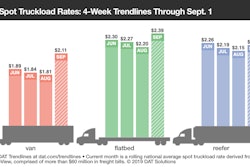
The American Transportation Research released a report on the safety and productivity of truck driver detention at customer facilities. The analysis is based on over 1,900 truck driver and motor carrier surveys conducted between 2014 and 2018.
Over the four year period, detention frequency and length has increased, creating negative impacts on driver productivity, regulatory compliance and compensation.
Key findings include:
- Drivers reported a 27.4% increase in delays of six or more hours.
- Female drivers were 83.3% more likely than men to be delayed six or more hours.
- There was a nearly 40% increase in drivers who reported that the majority of their pick-ups and deliveries were delayed over the past 12 months due to customer actions.
- The average excessive detention fee per hour charged by fleets was $63.71, slightly less than the average per hour operating cost of $66.65 found in ATRI’s Operational Costs of Trucking.
- The negative impact of detention on carrier revenue and driver compensation may be greater among smaller fleets (<50 power units) with 20% reporting that they do not charge for excessive detention in order to stay competitive with larger fleets.
Along with the research, the Federal Motor Carrier Safety Association proposed changes for the hours of service rule could make a difference for the wait.
Read Next: Proposed Hours of Service Rule Changes Aim to Give Truckers Flexibility but Bring Safety Concerns
Many drivers claim to have had “on-duty driving time” taken away from them as they sit and wait at shipping and receiving docks. Drivers have reported waiting at docks for upwards of five hours before being able to move on with their next load.
Often, the wait times result in less pay for the drivers as most are paid by the driven mile, not by the hours clocked in on their electronic logging devices (ELDs). With the proposed rules, the three-hour pause would allow an off-duty break without hitting the 14-hour time limit.
“ATRI’s new detention research definitely helps us understand the full financial impact associated with detaining drivers,” said Edgar R. McGonigal, chief financial officer of Bestway Express, Inc. “From a safety and economic perspective, this research gives the trucking industry new insight into how both carriers and drivers should implement driver detention strategies.”


















